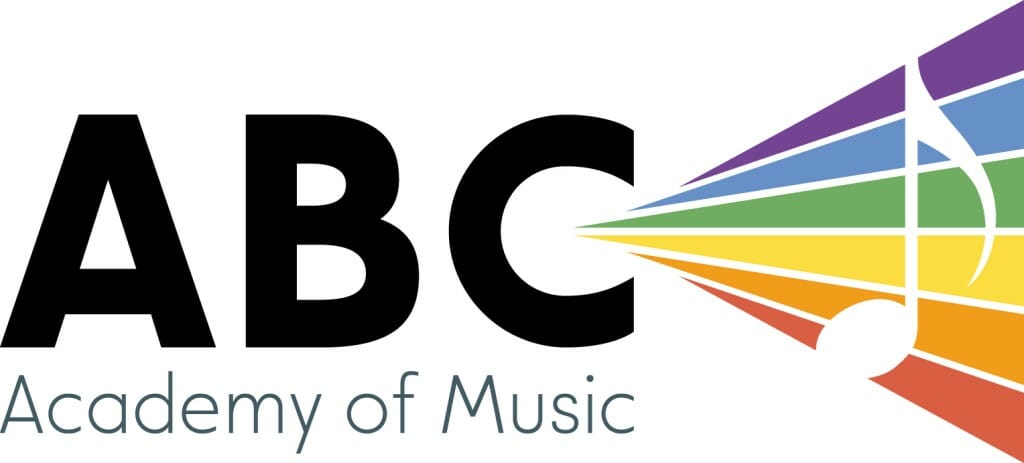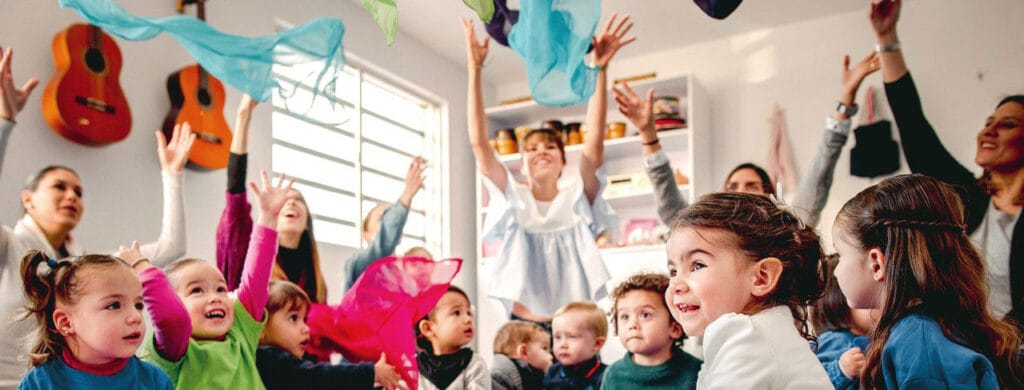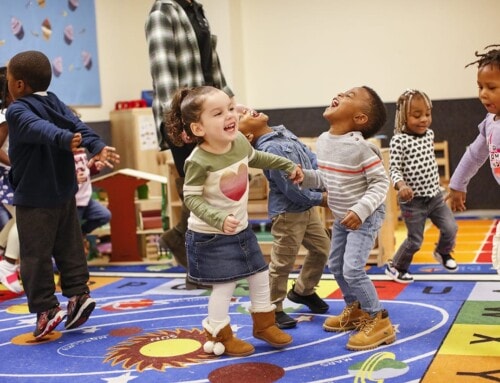How to improve kids pre-literacy and pre-numeracy skills? Early childhood is a critical time for developing fundamental skills that lay the foundation for future learning. Pre-literacy and pre-numeracy skills are vital components of a child’s cognitive development, and incorporating music-related activities, and music classes into their daily routine can make the learning process not only educational but also incredibly enjoyable.
In this article, you’ll explore various ways to use music lessons, music related programs, and activities to enhance these essential expertness.
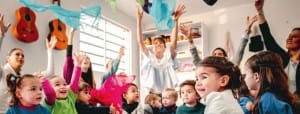
Incorporating music-related activities into your children daily routine enhance pre-literacy skills. Picture from Pinterest.
Sing-along Songs
One of the easiest and most impactful ways to introduce children to the captivating realms of music and language is through sing-along songs. Although classics like “Twinkle, Twinkle, Little Star,” “Baby Shark,” or “You Are My Sunshine” serve as excellent initial steps for fostering literacy and numeracy development, they offer more than just a starting point. These tunes are treasure troves of rhymes and repetitive patterns.
These rhythmic and patterned elements play a crucial role in helping children grasp concepts such as rhythm, rhyme, structure, and sequences, laying a strong foundation for enhance your children pre-literacy and pre- numeracy skills.
To elevate the experience, consider incorporating physical movements or actions that align with the song lyrics. The key is to keep it dynamic, avoiding a routine that becomes predictable. This approach not only boosts motor skills but also transforms learning into an interactive adventure, fostering concentration and engagement.
Watch our video about our early childhood music programs to learn more about our music programs for preschoolers, toddlers and babies https://www.music-lessons.ca/toronto/classes/
Musical lessons for children and musical instruments
Introducing your children to musical instruments is a fantastic way to stimulate their curiosity and creativity. Age- and size-appropriate Instruments like small shakers, tambourines, xylophones, and drums can be used to create a world of sound exploration. Encourage your kids to experiment with these instruments and discover the different sounds they can produce.
You can also easily make your own crafty, do-it-yourself instruments at home, which is a great activity to share with toddlers and preschoolers. Additionally, we can teach basic counting by tapping out rhythms or counting beats together. This is a subtle way to introduce early numeracy while having fun with music.
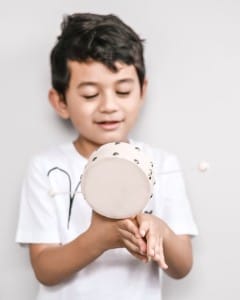
Small shakers, tambourines, xylophones, and drums can create a world of sound exploration, besides increasing pre-literacy skills.
Listening and Responding
Active listening can be honed through music. Play a variety of music genres and encourage your children to listen attentively. Asking questions like, “What instruments do you hear?” or “How does this music make you feel?”. These questions help your kids to build vocabulary and emotional awareness. Call and response is a huge part of music, and a huge part of life, growing conversational and listening dexterity without them knowing.
Using descriptive words like fast, slow, loud, and soft to describe the music. This not only expands their vocabulary but also helps them express their feelings and preferences.
Book a free demo class for your kid at https://www.music-lessons.ca/toronto/classes/
Storytelling Through Music (ABC Academy of Music)
Combine the power of storytelling with music to boost pre-literacy skills. Create simple stories or narratives using songs as the backdrop. For instance, take a classic song like “The Itsy Bitsy Spider” and turn it into a captivating story about a spider’s adventure.
Encourage children to add their own twists to the story, fostering creativity and narrative skills. This activity not only enhances language development but also sparks their imagination.
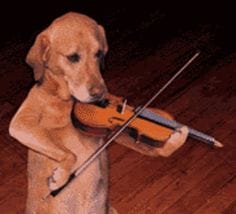
Combining the power of storytelling with music to boost pre-literacy skills. Picture from Pinterest.
Alphabet and Number Songs
Alphabet and number songs are fantastic tools for teaching pre-literacy and pre-numeracy skills. Classics like “ABC” and “One, Two, Buckle My Shoe” can be both educational and entertaining (once again, as an introduction to music and development, as there is a world of music out there!). Singing songs like these regularly reinforce letter and number recognition, as well as sequences.
Incorporating music lessons into early childhood education is a delightful and effective way to enhance kids and toddlers abilities. Through sing-along songs, musical instruments, active listening, storytelling, and alphabet/number songs, children can develop essential cognitive skills while having a blast. Remember that the key to successful learning is making it enjoyable, so be enthusiastic, patient, and, most importantly, have fun with your little ones as they embark on their educational journey through music programs and music lessons.
Music activities for children, Pro Tip – there are books out there that are designed to work with music, providing visuals and stories, objects, and number opportunities to get your children school-ready with music you already know. They are an internet search away!
Book your free demo class of Music Together and let your child get the most of our tailored programs, that stimulates cognitive and emotional growth by activities full of fun at ABC Academy of Music https://www.music-lessons.ca/toronto/classes/
ABC Academy of Music in Toronto / Music school at Toronto, Music Together programs and music related activities in Toronto GTA, Music lessons and Music Together program at Brampton, Caledon, Woodbribge Vaughan and other locations, offer amazing music lessons and tailored program for your children at any age. Our schedule is suitable with your busy lifestyle.
Follow us on our social channels to know more about the benefits of music lessons for preschoolers, and don’t miss our news!
PS – DID YOU FIND THIS INTERESTING?
Check out our post:
“Music in early stages of childhood: nurturing feelings of closeness and protection”
* Link is in PROGRESS*
Additional Reading for Your Interest:
Introducing your children to musical instruments
